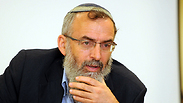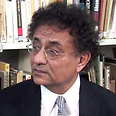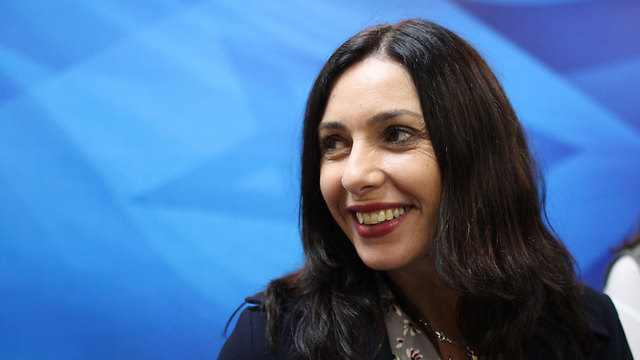
The awakening of moderate Orthodoxy
Op-ed: Tzohar's decision to form a conversions court is a revolutionary one. The distinct majority in Israel is of moderate Jews, but Israel is a 'minocracy' where the minority dictates to the majority. It was high time the House of Hillel stopped complaining and started acting against the House of Shammai.
Several months ago, one of the senior Tzohar rabbis told me about the idea to form a conversions court. "It won't happen anytime soon, and we're very hesitant," he stressed. Why, this is a revolutionary move. Rebellion against the rabbinical institution. "The Halacha is our guiding principle," he said, "and we support change, but we don’t support dividing the nation."
Turns out that what was supposed to take years, took several months. It is safe to assume the formation of the new coalition shattered any hope for a change that could start from within, making the decision to form a conversions court a turning point.
It's not just the issue of conversions. It's mostly the question of "what is Judaism?" Several sub-movements have been formed within the orthodox movement over the past few years - some moderate, some liberal, some feminist in nature. Pluralism among orthodox Jews. It also happened, and perhaps mostly, due to the influence of several movements of American orthodoxy.
The Tzohar rabbis won't admit it, but they are heading towards US Rabbi Avi Weiss' "open orthodoxy." It wasn't too long ago that Israel's Chief Rabbinate doubted whether Weiss has the authority to declare a man as Jewish, while in the US he was accused of moving closer to conservatives.
Among the more controversial issues is the "partition" - the separation between men and women at the synagogue. This is one of the more striking differences between conservatives and orthodox. In more moderate orthodox movements, the partition becomes looser, more transparent, and lower.
In one synagogue in the Boston area, which identifies itself as orthodox, the partition has been completely removed, even though men and women still sit on different sides of the synagogue. I encountered some well-known guests from Israel there, who identify with the orthodox movement. Far away from the homeland, they allow themselves.
Why did the rabbis of Tzohar need this new move? Well, it happened because Israel is a "minoracy." There is a distinct majority in Israel, even among traditional Jews, of moderate Jews. The House of Hillel and not the House of Shammai. So is the case in issues of marriage, divorce, kashrut and certainly, conversions.
Haredi rabbi Haim Amsalem, formerly of Shas, authored the book "The Seed of Israel," proving it is possible to adopt a more moderate approach. The book is based on Halacha laws, not on Meretz's platform. Amsalem and the rabbis of Tzohar represent the majority. Except this majority is meaningless because the rabbinate’s authorities are determined by the government and, in fact, based on coalition agreements. The previous coalition tried to advance one tiny change: Allow city rabbis to perform conversions. However, a new coalition was then formed. The minority dictates to the majority. This isn't a democracy, it's a minoracy.
The rabbinical rebellion will not solve the problem of 350,000 immigrants who aren't Jewish, because the decision about who has the authority to determine who is Jewish is not a religious decision, but a political one. It is the prime minister who too easily surrenders to zealots. He is the one who replaced the moderate Zionist orthodoxy with the ultra-haredim. And even though at this point this is merely a symbolic issue, it is still noteworthy. The House of Hillel went from complaining to finally waking up. To be continued.
There’s more than 'for' or 'against' to every issue
"Good morning, are you free to participate in a panel this evening about the High Court of Justice's decision on the Infiltration Prevention Act?" I received three phone calls like that over the past week. And then the same question, every time: "Are you for, or against?" That's just it, that not every issue necessitates having a position that is either "for" or "against." There are other positions.
The crux of the matter is that there is no historical evidence to prove that judges are smarter than politicians, and the claim that lawmakers are dangerous and that judges are needed to protect democracy or human rights is farfetched. It doesn't mean every High Court decision on controversial public issues should be condemned. Far from it.
With regards to sending asylum seekers to detention facilities, there are many considerations that make up a part of a broader policy. Not every reason can be presented in court. A veteran immigrant from Ethiopia, who reached a senior position, presented me with reasons from the field why the presence of asylum seekers in city centers must be minimized. She told me how it affects the Ethiopian immigrants. They become strangers.
She talked about mixed couples. It's a sensitive issue. There are reasons that cannot be presented, because they do not fall under the rules of politically correct. Should a Sudanese man be forbidden from spending time with an Ethiopian woman? Of course not. And despite that, from the Ethiopian community's point of view, this is a serious problem. So what can they do? How can they protect the community's interest while at the same time avoid slipping into racism? How do you prevent the enormous price, which is too heavy to bear, paid by the residents of south Tel Aviv?
The executive branch deals with these issues on the ground. The legislative branch balances the executive branch using legislation. The judges, with all due respect, are not aware of all of the considerations, because some of them are hidden from view. For example, using the removal to detention facilities and arrests to create deterrence, encourages them to leave, and prevents further waves of asylum seekers from arriving.
The fence, with all due respect, is just one part of it. These are reasons known to anyone well-versed in the issue, but the judges are not discussing the reasons the authorities cannot present. The executive and legislative branches' considerations are far broader. The laws that were struck down by the court led 6,500 asylum seekers to leave. The High Court of Justice's decisions could hurt the process of deterrence and removal, therefore the use of the weapon of striking down laws needs to be kept only for very extreme cases. And despite that, after two Knesset laws were blatantly struck down, the decision this week was a bit more restrained.
The problem is not just the High Court of Justice. The problem is that the government was supposed to formulate a slightly clearer policy. For example, granting work permits to all asylum seekers while putting aside a significant part of the salary for a fund that will be made available to them on the day of their departure. This achieves two goals in one: Both treating them humanely, and encouraging them to willingly leave.
If we go back to the conversation in the press, we encounter a problem. Because the conversation, and not just about asylum seekers, is reserved mostly to those who are either "for" or "against." There are some academics and activists who hold far more complex positions. Their opinions matter more, but are being heard less. A lot less.
Ministers interfering with content
Yossi Sarid and Yuli Tamir were education ministers. They interfered with content. The first decided to include Palestinian poet Mahmoud Darwish in the curriculum while the other decided to include the Nakba. A public debate arose. It is unclear whether the ministers' decision to interfere with the curriculum was appropriate. What is clear is that the judicial system did not interfere. No one wrote a legal document barring ministers from interfering with content.
The education and culture ministers of the current era are also interfering with content. They oppose the funding of a play inspired by a murderer. This is a far more reasonable decision than the decision to force specific content that is in line with the minister's political agenda. But here, the legal imperialism decided to wake up. The pyramid was turned on its head. The bureaucrats get to decide. The ministers must obey. Unbelievable.
There was a very similar dilemma in the United States. The National Endowment for the Arts decided to fund certain creations, and the director of the foundation rejected the funding based on a clause requiring "taking into consideration general standards of decency and respect for the diverse beliefs and values of the American public." The Supreme Court was called to decide on the matter, and it determined there is no obligation to fund these creations.
Sometimes, there is no need for legal philosophizing. You just need a bit of common sense. This week, and this isn't the first time, the Attorney General's office has lost it.



















